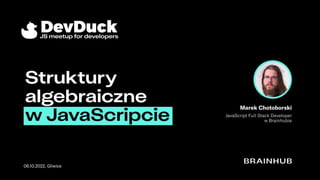
Struktury algebraiczne w JavaScripcie
- 3. marek ● JS Developer @ BH for 4+ years ● FP, JS, react, elixir, haskell ● intercaetera.com
- 4. po co?
- 6. jest z tym problem
- 7. ← to jest trudne
- 8. problem → → rozwiązanie
- 9. problem → → rozwiązanie
- 10. struktury algebraiczne - rozwiązują ogólne problemy* - odkryte racjonalnie** - bardzo rygorystyczne***
- 11. intuicja - do budowania systemów - do naprawiania istniejących aplikacji - do refaktoryzacji - do rozwiązywania bugów
- 12. ← potrzebna tu
- 13. co to?
- 14. - zbiór - operacja na nim - zasady które spełnia - typ - funkcja na nim - zasady które spełnia </>
- 15. (
- 16. notacja typów - Int, String — typy - n :: Type — n należy do typu Type - Constr a — konstruktor/generyk (jak T<a>) - a -> b — funkcja - a -> b -> c — funkcje są curry’owane f = (a, b) => a+b ~= g = a => b => a + b f(2, 3) => 5 ~= g(2)(3) => 5 currying
- 18. )
- 19. funktory <$>
- 20. Int -> Bool () -> Int Identity Int Dict String Int List Int Maybe Int
- 21. Int -> Bool () -> Int Identity Int Dict String Int List Int Maybe Int
- 22. a -> Bool () -> a Identity a Dict String a List a Maybe a
- 23. monady funktory są jak burrito 🌯
- 25. Effect a () -> a
- 26. 1 :: Number () => 1 :: Effect Number () => 2 :: Effect Number () => ‘alpha’ :: Effect String () => [1, 2, 3] :: Effect List Number
- 28. funktor = typ + fmap
- 29. fmap f :: (a -> b) -> f a -> f b
- 31. fmap Array :: (a -> b) -> Array a -> Array b [1, 2, 3].map(x => x*2) => [2, 4, 6]
- 32. fmap Effect :: (a -> b) -> Effect a -> Effect b
- 35. różne funktory - kowariantne - kontrawariantne - bifunktory i profunktory - transformacje naturalne - aplikatywy - funktory monoidalne - …monady?
- 36. monoid <>
- 37. monoidy nie są funktorami
- 38. monoid = typ + concat + empty
- 41. monoidy mogą być funktorami
- 43. monoidy mogą być funkcjami
- 44. typ: a -> a concat: _.flow empty: x => x ← czyli po prostu składanie funkcji
- 45. ale przede wszystkim monoidy są redukowalne
- 49. concat f :: f -> f -> f zwykle
- 50. concat Effect :: Effect -> Effect -> Effect
- 51. można tak, ale to niezbyt praktyczne
- 52. w programowaniu funkcyjnym chodzi o składanie funkcji
- 53. jak mamy takie same typy to nie ma problemu (a → a) ° (a → a) ⇒ (a → a) (Int → Int) ° (Int → Int) ⇒ (Int → Int)
- 54. ale jak nie, to funkcje muszą się zgadzać w typach (a → b) ° (b → c) ⇒ (a → c) (Int → String) ° (String → Bool) ⇒ (Int → Bool)
- 55. ale co jeśli chcielibyśmy złożyć 2 × a -> Effect a
- 56. compose :: (a -> b) -> (b -> c) -> (a -> c)
- 57. concat (a -> Effect c) :: (a -> Effect b) -> (b -> Effect c) -> (a -> Effect c)
- 59. ale co my teraz zrobiliśmy?
- 61. “All told, a monad is just a monoid in the category of endofunctors.”
- 62. monada =<<
- 63. monada = funktor + chain
- 64. chain f :: (a -> f b) -> f a -> f b
- 66. chain Effect :: (a -> Effect b) -> Effect a -> Effect b
- 70. “Once you understand monads, you lose the ability to explain them to others.”
- 71. mam nadzieję że poszło mi w miarę ok
